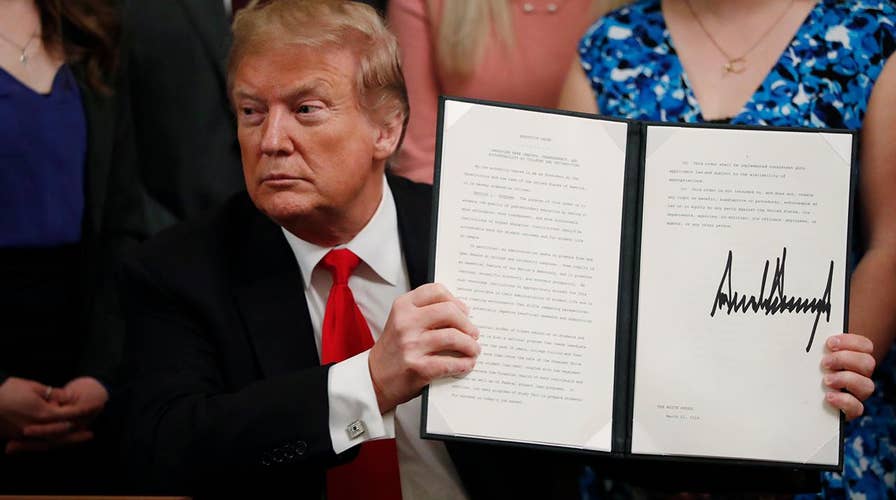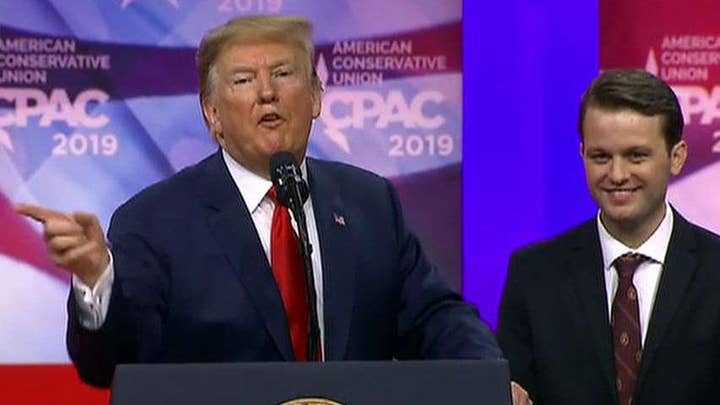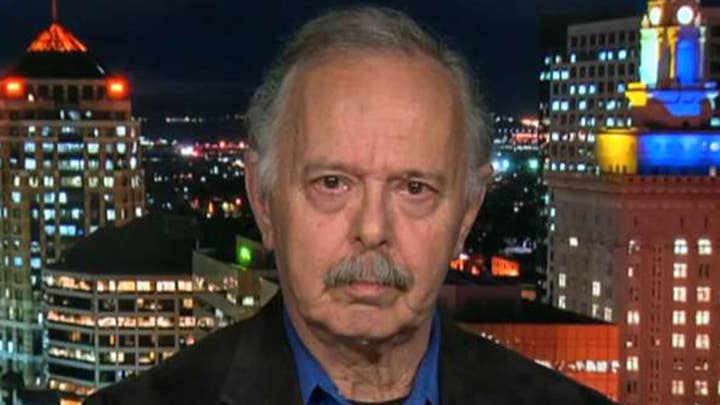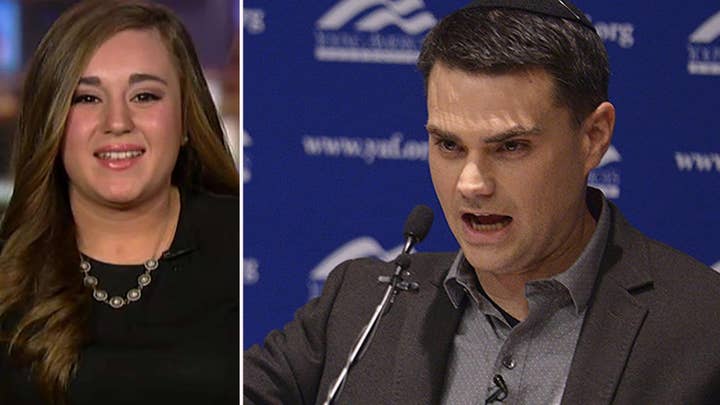President Trump signs executive order protecting free speech on college campuses
Trump directed his Cabinet agencies to tie federal grants for education and research to more aggressive enforcement of the First Amendment; chief White House correspondent John Roberts reports.
Texas is poised to become the latest state in the country to enact a measure aimed at protecting free speech on public college campuses.
A day before President Trump signed his executive order last month that threatened colleges with the loss of federal research funding if they don’t protect students’ free speech rights, the Texas Senate passed a bill prohibiting public universities from rejecting appearances by controversial figures.
The legislation, which passed unanimously in the state Senate, would require all Texas colleges and universities to come up with more uniform policies regarding free speech as well as dole out disciplinary measures for any student who interferes with free speech activities on campus and set up a system for addressing free speech infringement complaints.
TRUMP SIGNS EXECUTIVE ORDER TO PROMOTE FREE SPEECG ON COLLEGE CAMPUSES
"Colleges and universities should provide the opportunity for students to hear others' points of view in a free and unrestrained manner," Texas state Sen. Joan Huffman R-Houston, said in a statement. "Senate Bill 18 is a direct result of the Committee's process of hearings and research toward that goal. This bill was constructed in an objective, non-partisan manner and will be applied equally to all groups and points of view."
The bill, which enjoys the support of Texas’ Republican Lt. Gov. Dan Patrick, has been referred to the Higher Education Committee in the Texas House, where it awaits a hearing.
The nationwide debate over the recent attacks on free speech on college campuses across the country has largely been driven by conservative activists and lawmakers, but both sides of the political divide have been affected by campus policies, or the lack thereof.
Three days after SB 18 passed through the state senate, former Texas Rep. Beto O’Rourke’s presidential campaign was barred from handing out flyers on the campus of the University of Texas at Austin. This follows a 2017 incident where Texas A&M University was threatened with a lawsuit for cancelling a rally featuring white nationalist Richard Spencer and another one that year when Texas Southern University halted a speech by conservative state Rep. Briscoe Cain, R-Deer Park, after disruptions by protestors.
Across the country, colleges and universities have been grappling with how to handle free speech issues in an extremely polarizing political environment. The University of California, Berkeley – a traditional hotbed of campus activism – has been thrust into the center of the debate amid violent protests and disruptions during appearances by right-wing speakers.
FLASHBACK: CONSERVATIVE ACTIVIST ATTACKED ON UC-BERKELEY CAMPUS DURING RECRUITMENT DRIVE
In February 2017, 150 leftist black-clad protesters rampaged through Berkeley’s campus, where they caused $100,000 worth of damage, beat students and forced the University of California to cancel a planned speech by right-wing provocateur Milo Yiannopoulos.
Later that year, a group of around 100 hooded members of Antifa stormed what had been a largely peaceful rally for free speech in the town of Berkeley and attacked at least five people, including the leader of a politically conservative group that had canceled an event a day earlier in San Francisco to avoid potential violence.
“I can see this popping up more and more,” Roy Gutterman, the director of Tully Center for Free Speech at Syracuse University, told Fox News. “It would be reasonable to see similar suits popping up with the events in Charlottesville."
CLICK HERE TO GET THE FOX NEWS APP
Gutterman was referring to the 2017 rally in opposition to the removal of a statue of Confederate Gen. Robert E. Lee on the campus of the University of Virginia that turned violent as white supremacists and neo-Nazis clashed with counterprotestors. Heather Heyer, 32, was killed when James Alex Fields Jr. drove a 2010 Dodge Challenger into a crowd on a pedestrian mall.
So far, Kentucky, South Dakota, Tennessee, Colorado, Iowa, and Arkansas – all Republican-heavy states – have passed legislation similar to the one being discussed in Texas.
The unrest on college campuses has become a major concern for the current White House administration, with Trump frequently bringing it up in speeches.
Shortly before signing his executive order, the president brought Hayden Williams, a conservative activist who was attacked while working a recruitment table on campus in Berkeley, on stage during his speech at the Conservative Political Action Conference in February.
“He took a punch for all of us,” Trump said of Williams. “And we could never allow that to happen. And here is, in closing with Hayden, here’s the good news. He’s going to be a wealthy young man.”
“If they want our dollars, and we give it to them by the billions, they’ve got to allow people like Hayden and many other great young people and old people to speak,” Trump said. “Free speech. If they don’t, it will be costly.”
Fox News’ Adam Shaw contributed to this report








